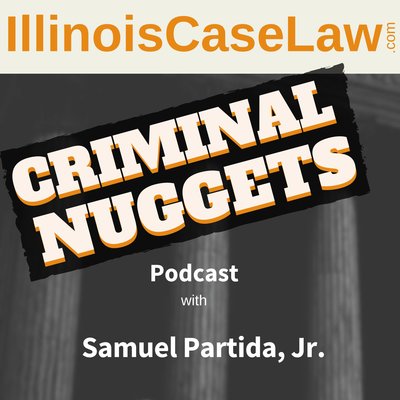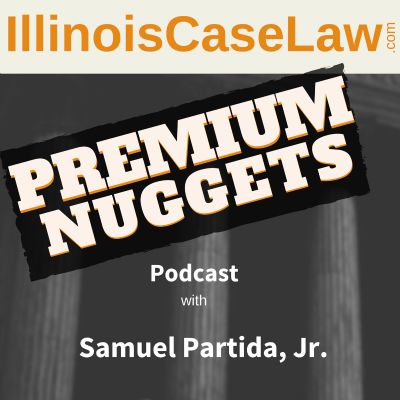Apr 20, 2020
People v. Patel, 2019 IL App (2d) 170766 (March).
State failed to produce discover for the SSS Hearing, they subsequently blew Trainor.
Charges
Defendant was charged with two counts of driving while under the influence of alcohol (625 ILCS 5/11-501(a)(1), (a)(2) (West 2016)), improper lane usage (id. § 11-709(a)), and speeding (id. § 11-601(b)).
He was suspended.
Files Petition
Before his first appearance defendant petitioned to rescind the summary suspension of his driving privileges (see id. § 2-118.1(b)). Along with that petition, defendant filed and served on the State motions for discovery and notices to produce pursuant to Illinois Supreme Court Rules 214 and 237.
The discovery requests included, among other things, the booking room video and the breathalyzer accuracy-check records.
The State filed no objections to any of the requests.
The Civil Discovery Rules
Rule 201. General Discovery Provisions
(b) Scope of Discovery.
(1) Full Disclosure Required. Except as provided in these rules, a party may obtain by discovery full disclosure regarding any matter relevant to the subject matter involved in the pending action, whether it relates to the claim or defense of the party seeking disclosure or of any other party, including the existence, description, nature, custody, condition, and location of any documents or tangible things, and the identity and location of persons having knowledge of relevant facts. The word “documents,” as used in Part E of Article II, includes, but is not limited to, papers, photographs, films, recordings, memoranda, books, records, accounts, communications and electronically stored information as defined in Rule 201(b)(4).
(d) Time Discovery May Be Initiated. Prior to the time all defendants have appeared or are required to appear, no discovery procedure shall be noticed or otherwise initiated without leave of court granted upon good cause shown.
(k) Reasonable Attempt to Resolve Differences Required. The parties shall facilitate discovery under these rules and shall make reasonable attempts to resolve differences over discovery. Every motion with respect to discovery shall incorporate a statement that counsel responsible for trial of the case after personal consultation and reasonable attempts to resolve differences have been unable to reach an accord or that opposing counsel made himself or herself unavailable for personal consultation or was unreasonable in attempts to resolve differences.
Rule 214. Discovery of Documents, Objects, and Tangible Things-Inspection of Real Estate
(a) Any party may by written request direct any other party to produce for inspection, copying, reproduction photographing, testing or sampling specified documents, including electronically stored information as defined under 201(b)(4), objects or tangible things, or to permit access to real estate for the purpose of making surface or subsurface inspections or surveys or photographs, or tests or taking samples, or to disclose information calculated to lead to the discovery of the whereabouts of any of these items, whenever the nature, contents, or condition of such documents, objects, tangible things, or real estate is relevant to the subject matter of the action. The request shall specify a reasonable time, which shall not be less than 28 days after service of the request except by agreement or by order of court, and the place and manner of making the inspection and performing the related acts.
See more on discovery in criminal cases.
Discovery Delayed
25 days later the State ordered all of the requested materials from the arresting police department.
On the first scheduled court date (31 days following the filing of the petition to rescind), the parties appeared on defendant’s petition. Before any hearing began, defendant told the court that he wanted to resolve the State’s failure to comply with his discovery requests.
After the court noted that no motion to compel was in the record, defendant apparently tendered to the court a written motion. That motion is not in the record before this court.
The prosecutor advised the court that, although the State had made a good-faith effort to comply with defendant’s discovery requests, it did not yet have the materials defendant wanted. The prosecutor did not elaborate on what precisely constituted this good-faith effort.
However, the prosecutor agreed that all of the materials that defendant sought were relevant and discoverable, and he indicated that he would have those materials for defendant the following week at the latest.
After advising the court that the parties had not held any conference pursuant to Illinois Supreme Court Rule 201(k), the prosecutor said that the State was ready to proceed on defendant’s petition to rescind.
Defendant told the court that he had tried to talk to the prosecutor that morning about the discovery requests. The prosecutor asserted that that conversation, which consisted solely of the parties’ agreement to present the problem to the court, did not amount to a conference as required under Rule 201(k).
Defendant then indicated that he was not ready to proceed on his petition.
Delay Attributed To Defendant
He asked the court to attribute to the State the delay in holding a hearing or, alternatively, to infer that the requested discovery materials were favorable to him.
Over defendant’s objection, the court
(1) held defendant’s motion to compel in abeyance
(2) ordered the State to produce the requested discovery by
September 21, 2017, which was the next court date, and
(3) tolled the statutory period in which defendant was entitled to
a hearing (see 625 ILCS 5/2-118.1(b)).
Motion To Rescind Suspension Based On Timing
On the next court date defendant filed a motion to rescind the suspension, arguing that he was entitled to a rescission because he was not given a timely hearing.
In court that day, the prosecutor advised the court that the State had now complied with all of the discovery requests.
Defendant asked the court to rescind the suspension because the delay in holding the hearing on the petition was attributable to the State. The court refused to do so, observing that, given that the State had tendered discovery to defendant, the issue of the State’s failure to comply was moot.
The court also noted that, mootness aside, there was no indication that the parties had participated in a Rule 201(k) conference, which was necessary before any sanction could be imposed on the State.
Issue
At issue in this appeal is whether the statutory summary suspension of defendant’s driving privileges should have been rescinded because the State’s delay in tendering to defendant the discovery he requested denied him a timely and meaningful hearing.
A Timely Hearing Required
Section 2-118.1(b) of the Illinois Vehicle Code (625 ILCS 5/2-118.1(b)) provides that a defendant “shall” be given a hearing on his petition to rescind within 30 days after the petition is received or on the first appearance date.
In People v. Schaefer, 154 Ill. 2d 250, 253 (1993), our supreme court explained that the statute “created two alternative dates for a hearing on a defendant’s challenge to a summary suspension:
(1) on the first court date set in the traffic citation issued
to the defendant ***; or
(2) within 30 days of a defendant’s written request for a hearing
on his petition to rescind.”
“The word ‘shall’ conveys that the legislature intended to impose a mandatory obligation.” People v. Moreland, 2011 IL App (2d) 100699, ¶ 8. The failure to comply with the requirements of section 2-118.1(b) results in the rescission of the suspension, unless the delay is “occasioned by the defendant.” In re Summary Suspension of Driver’s License of Trainor, 156 Ill. App. 3d 918, 923 (1987). See also People v. Mizaur, 376 Ill. App. 3d 1066, 1067 (2007), where we held that a court date set out in a defendant’s bail bond constitutes the “first appearance date” for purposes of section 2-118.1(b) of the Illinois Vehicle Code.
No Reason For The Delay
We find no confirmation in the record that the State produced any discovery to defendant on or before the day it was tendered in.
The State has never disputed that it would have been feasible to produce all responsive discovery to defendant, had the State acted on defendant’s requests in a more timely fashion.
The record shows that the State simply failed to make any effort toward procuring the requested materials until 25 days after defendant served his requests on the State. By that time, the first appearance date was less than a week away. Conspicuously absent from the record is any excuse from the prosecutor as to why it took 25 days to begin the process of procuring the materials or why the process could not be expedited once the prosecutor learned that the materials might be unavailable for the court date.
Answering Ready Is Not A Discovery Cure
Moreover, the prosecutor’s answer that the State was “ready” for the hearing, unfairly shifted to defendant the burden of the State’s noncompliance with discovery. The State put defendant in the untenable position of having to either
(1) proceed to a timely hearing that day without the materials
that were needed to attempt to establish a prima facie case for
rescission or
(2) answer “not ready” for the hearing, thereby acquiescing to a
continuance for purposes of tolling the time requirements contained
in section 2-118.1(b) of the Illinois Vehicle Code.
See Guillermo, 2016 IL App (1st) 151799, ¶ 25 (holding that an agreed continuance “temporarily suspended the running of the period within which a hearing on the defendant’s petition to rescind had to be held”).
There Was No 201(k) Violation
The State urges, and the trial court found, that defendant failed to comply with Rule 201(k) before presenting his motion to compel.
The record demonstrates defendant’s compliance with Rule 201(k).
Prior to presenting a motion to compel, defense counsel asked the court to pass the case so that he could continue conferring with the prosecutor about discovery. When the matter was recalled, defense counsel informed the court that he had spoken to the prosecutor about what the State “did not have and wasn’t capable of producing.”
The prosecutor complained to the court that defense counsel had failed to offer to work things out or to get another date the next week.
Furthermore, nothing in the record suggests that defendant was aware that the State would be unable to tender discovery in court that day. When it became clear that the State could not produce discovery on, defense counsel appropriately discussed the matter with the prosecutor before presenting a motion to compel.
This Is Not A Discovery Sanction
This holding has nothing to do with discovery sanctions.
Unless defendant occasioned the delay in the proceedings, he was entitled to a hearing that complied with the time constraints of section 2-118.1(b) of the Illinois Vehicle Code.
In the absence of any excuse from the prosecutor as to why the State failed to timely produce the requested materials—which were admittedly discoverable and even integral to the defense—and in the absence of any justification by the trial court for attributing the time to defendant, there is simply no basis to conclude that defendant occasioned the delay of the hearing.
Holding
Under these circumstances, the delay of the rescission hearing, should have been attributed to the State rather than to defendant. Consequently, we determine that the trial court abused its discretion in ruling otherwise, i.e., in its decision to “toll Trainor” for one week while the State complied with its discovery obligations.
Under the circumstances, and in light of the expedited nature of the rescission proceedings at hand, it is not apparent what more defense counsel could have done to resolve the discovery issues, short of waiving his client’s right to a timely hearing.
For the reasons stated, we reverse the judgment of the circuit court of Du Page County denying defendant’s petition to rescind the statutory summary suspension of his driving privileges.
The clerk of this court shall immediately notify the Secretary of State that defendant’s statutory summary suspension has been rescinded.



